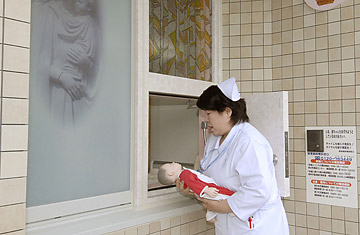
A nurse carries a baby doll, demonstrating the Jikei Hospital's baby drop-off system as the new procedure is unveiled to the media in the southern city of Kumamoto, Japan, May 1, 2007.
The news shocked Japan, riling conservatives who had already claimed that Jikei's baby hatch would only encourage parents to abandon their children. "Parents have an obligation to raise their children," government spokesman Yasuhisa Shiozaki said. "This is very regrettable."
Yet, while the stork cradle drew the headlines, something far more regrettable happened in the shadows three days later. On May 18, a young Japanese couple were arrested after their one-year-old baby was found wrapped in a plastic bag and dumped in a gutter. Four months before, the boy had allegedly been stuffed into the luggage compartment of a motorcycle while the parents gambled at a pachinko parlor, and may have suffocated to death while they played.
The connection between a grisly death and an abandonment unimaginable for most parents is clear: In a country that already has one of the lowest birthrates in the world, Japanese parenting is in a crisis. Children are paying the obvious price, but so is society. If the country can't find a way to save its fractured families, any hope of preventing rapid depopulation might be lost. "In the last 15 years, [child] abuse cases have increased so much," says Masami Ohinata, a developmental psychology professor at Keisen University. "I consider this increase an SOS sign that tells us we live in a society where parenting is very hard."
Social workers say that it's paradoxically the shrinking size of the Japanese family that is raising pressure on parents. Where young couples would have once been able to draw on the extended clan for support and advice, urbanization and atomization have amputated those ties. "Families are more isolated now, and parents are backed into a corner," says Jun Saimura, head of social work research at the Japan Child and Family Research Institute. "In the old days, if young parents had a problem, they could seek advice from the neighbors in their community. But that local community is weakened."
Instead, stressed parents are turning to the government — there were 30,000 consultations with child welfare offices during fiscal 2005, more than 30 times the total in 1990. Critics say that Japan's social welfare services are too passive, doing too little to head off crises until it's too late. Shortcut solutions like Jikei Hospital's stork cradle are more common, giving anxious parents an anonymous out rather than providing them with meaningful support. But an increasingly budget-conscious government doesn't appear eager to allocate the necessary funding. "The child consultation services are very understaffed and suffering hard," says Saimura.
Jikei Hospital's stork cradle is also a reminder that options are few for Japanese couples facing unwanted pregnancies. Many opt for abortion. Japan has no legal or moral opposition to ending pregnancies, and the abortion rate is a relatively high 22.2% — 22.2 abortions for every 100 live births — and is rising fast among women below 25, despite the fact that premarital cohabitation is rare in Japan. But while abortion is common, adoption in Japan is virtually unheard of, although there are many couples eager to take in children. But the law is stacked in favor of birth parents' rights, even in cases of abuse, neglect or outright abandonment.
As child abuse and parental stress receive more sympathetic attention in the Japanese media, there's hope that the country may be able halt this growing social rot. Prime Minister Shinzo Abe has run on a platform of restoring Japan's traditional values — the right kind of rhetoric if he can actually help reknit Japan's broken families. Saimura notes that the health ministry just began funding a new service that will dispatch volunteers to visit the homes of new parents and provide support if they're struggling. The program is tragically too late for some children, but it sure beats the stork cradle.
— Reported by Yuki Oda/Tokyo
